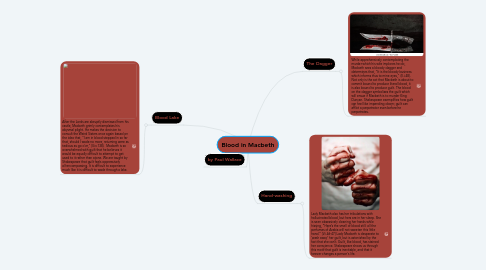Blood in Macbeth
by Paul Wallace

1. Blood Lake
1.1. After the Lords are abruptly dismissed from his castle, Macbeth grimly contemplates his abysmal plight. He makes the decision to consult the Weird Sisters once again based on the idea that, "I am in blood stepped in so far that, should I wade no more, returning were as tedious as go o'er," (II.iv.138). Macbeth is so overwhelmed with guilt that he believes it would be equally difficult to attempt to get used to it rather than atone. We are taught by Shakespeare that guilt feels oppressively all-encompassing. It is difficult to experience much like it is difficult to wade through a lake.
2. by Paul Wallace
3. The Dagger
3.1. While apprehensively contemplating the murder which his wife implores he do, Macbeth sees a bloody dagger and determines that, "It is the bloody business which informs thus to mine eyes," (II.i.48). Not only is the act that Macbeth is about to commit bound to produce literal blood, it is also bound to produce guilt. The blood on the dagger symbolizes the guilt which will ensue if Macbeth is to murder King Duncan. Shakespeare exemplifies how guilt can feel like impending doom; guilt can afflict a perpetrator even before he perpetrates.
4. Hand-washing
4.1. Lady Macbeth also has her tribulations with hallucinated blood, but hers are in her sleep. She is seen obsessively cleaning her hands while hissing, “Here’s the smell of blood still: all the perfumes of Arabia will not sweeten this little hand.” (V.i.46-47) Lady Macbeth is desperate to ‘wash away’ her guilt, but is astonished by the fact that she can’t. Guilt, like blood, has stained her conscience. Shakespeare shows us through this motif that guilt is inevitable, and that it forever changes a person's life.


